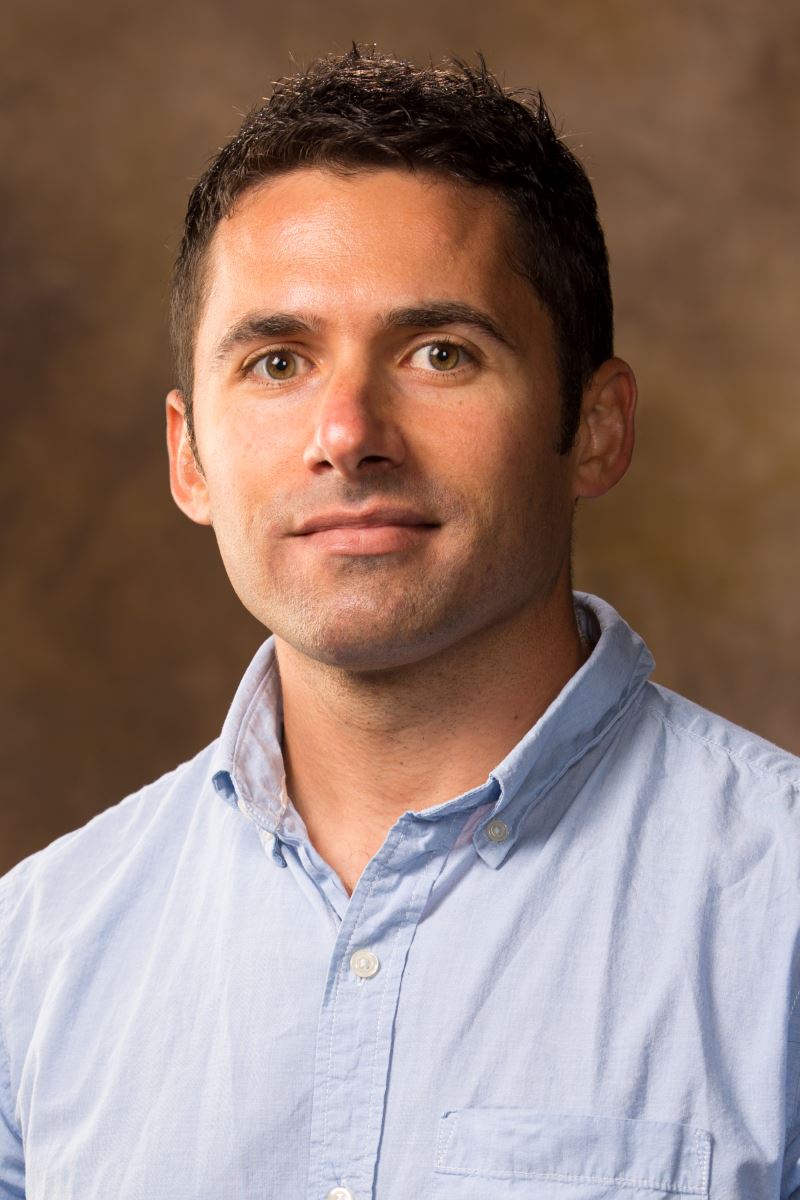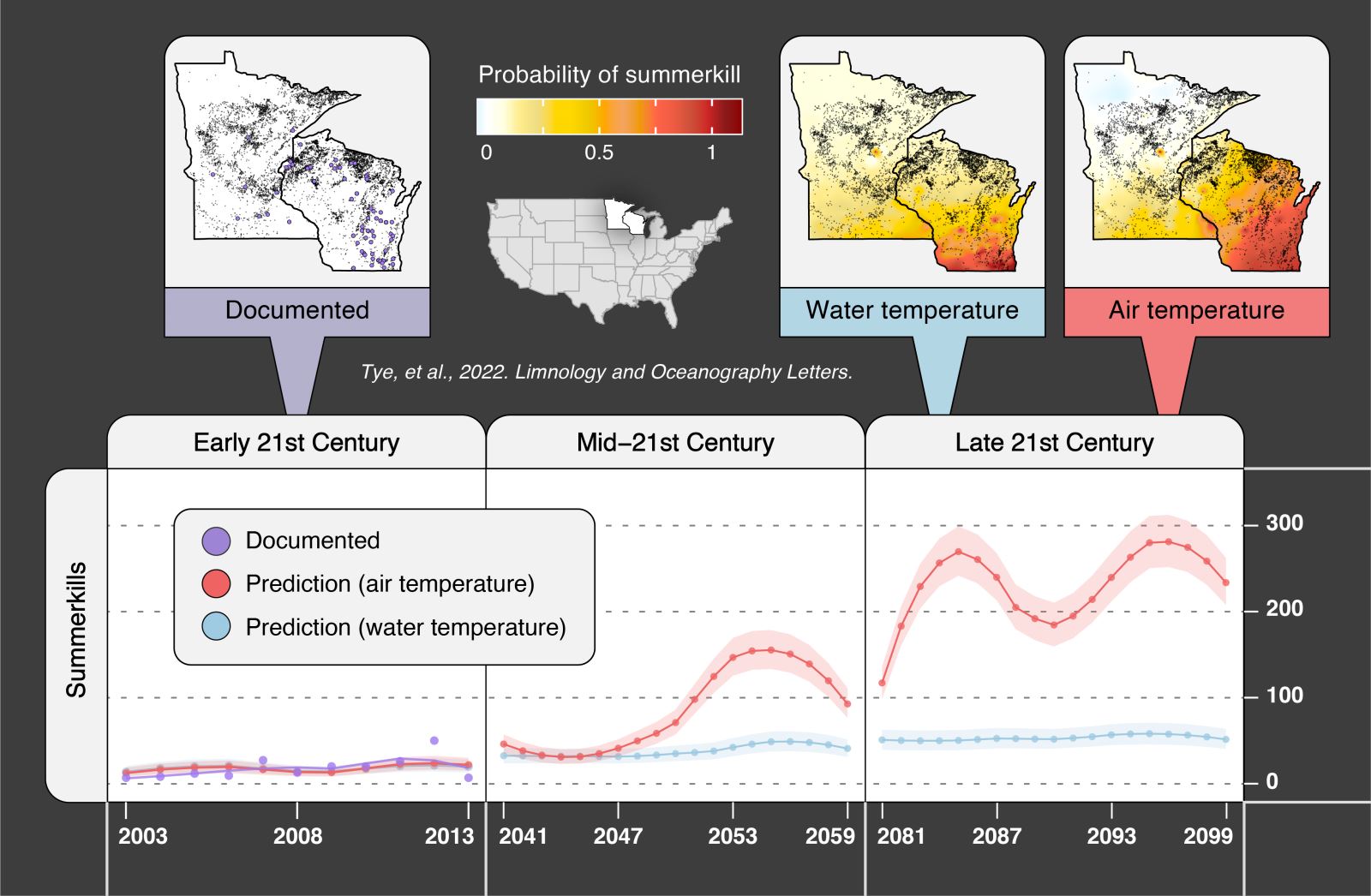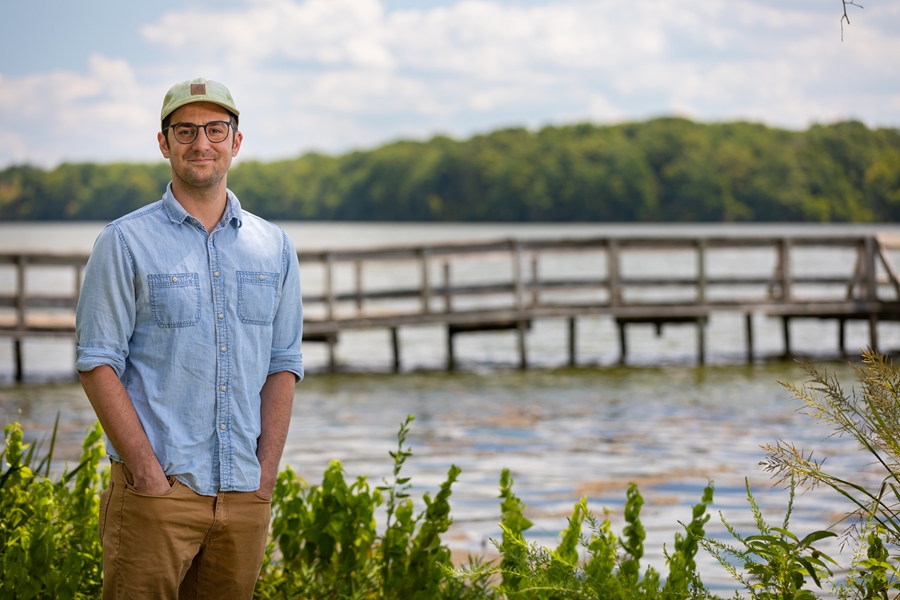As the planet’s climate has gotten warmer, so has the prevalence of fish die-offs, or mass mortality events. These die-offs can have severe impacts on the function of ecosystems, imperil existing fish populations and reduce the global food supply. And the frequency of these events appears to be accelerating, with potentially dire consequences for the world if global carbon emissions are not substantially reduced over the 21st century.
Those are the findings of a recent paper co-authored by two members of the University of Arkansas Department of Biological Sciences: doctoral student Simon Tye and associate professor Adam Siepielski, along with several of their colleagues.
 |
| Adam Siepielski |
The paper, “Climate warming amplifies the frequency of fish mass mortality events across the north temperate lakes,” compiled 526 documented cases of fish die-offs that occurred across Minnesota and Wisconsin lakes between 2003 and 2013. The researchers determined there were three main drivers of these events: infectious diseases, summerkills and winterkills.
The researchers then narrowed their focus to summerkills — fish mortalities associated with warm temperatures. They found a strong relationship between local air and water temperatures and the occurrence of these events, meaning they increased in frequency as temperature increased. Moreover, their models that used either air or water temperature provided similar results, which is important because air temperature data is more widely available than water temperature data across the world.
 Finally, with a historical baseline established, the team used air and water temperature-based models to predict frequencies of future summerkills.
Finally, with a historical baseline established, the team used air and water temperature-based models to predict frequencies of future summerkills.
The results were sobering. Based on local water temperature projections, the models predicted an approximate six-fold increase in the frequency of fish mortality events by 2100, while local air temperature projections predicted a 34-fold increase. Importantly, these predictions were based on temperature projections from the most severe climate change scenario, which was the only scenario with the necessary data for these analyses.
As Tye explained, “If there are eight summerkills per year now, the models suggest we could have about 41 per year based on water temperature estimates or about 182 per year based on air temperature estimates."
“We think predictions from the water temperature model are more realistic, whereas predictions from the air temperature model indicate we need to better understand how and why regional air and water temperature estimates differ over time to predict how many mortality events may occur.”
Nevertheless, their models reveal strong associations between rising temperatures and frequencies of ecological catastrophes.
Though the study used data related to temperate northern lakes, Tye said the study is pertinent to Arkansas. “One of the findings of the paper is that similar deviations in temperature affect all types of fish, such that a regional heatwave could lead to mortalities of both cold- and warm-water fish,” he said.
“Specifically, climate change is more than gradually increasing temperatures because it also increases temperature variation, such as we experienced much of this summer,” he explained “In turn, our findings suggest these rapid changes in temperature affect a wide range of fish regardless of their thermal tolerance.”
Siepielski added, “This work is important because it demonstrates the feasibility of using readily obtainable data to anticipate fish die offs.
“As with many examples of how climate warming is negatively affecting wild animal populations, this work reveals that temperature extremes can be particularly detrimental.”
“The large scale of the project, using thousands of lakes and over a million air and temperature data points, is particularly impressive,” Siepielski added. “Lakes outside the study area, including those in Arkansas and surrounding areas, are not likely to be immune to these events increasing in frequency.”
Siepielski encouraged citizens of Arkansas to help document these events when they find evidence of them, even on their own property, by contacting the relevant authorities.
The paper was published in Limnology and Oceanography Letters. Tye and Siepielski are joined by co-authors Andrew Bray, Andrew L. Rypel, Nicholas B.D. Phelps and Samuel B. Fey.
About the University of Arkansas: As Arkansas' flagship institution, the U of A provides an internationally competitive education in more than 200 academic programs. Founded in 1871, the U of A contributes more than $2.2 billion to Arkansas’ economy through the teaching of new knowledge and skills, entrepreneurship and job development, discovery through research and creative activity while also providing training for professional disciplines. The Carnegie Foundation classifies the U of A among the few U.S. colleges and universities with the highest level of research activity. U.S. News & World Report ranks the U of A among the top public universities in the nation. See how the U of A works to build a better world at Arkansas Research News.
Topics
Contacts
Simon Tye, doctoral student
Biological Sciences
308-627-5252, simontye@uark.edu
Adam Siepielski, associate professor
Biological Sciences
479-575-6357, amsiepie@uark.edu
Hardin Young, assistant director of research communications
University Relations
479-575-6850,
hyoung@uark.edu
